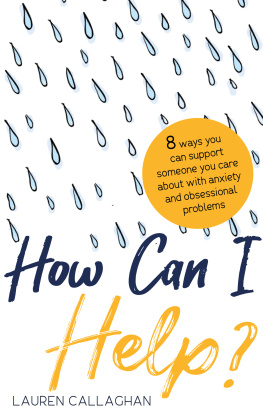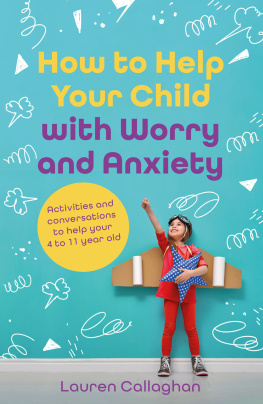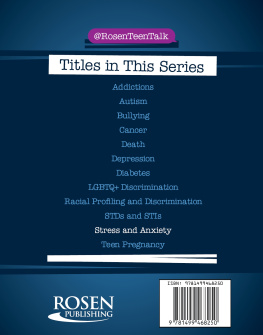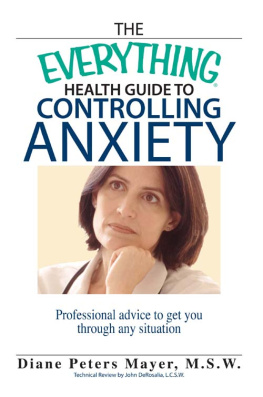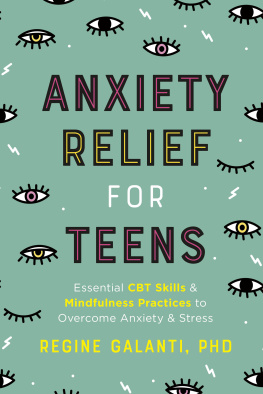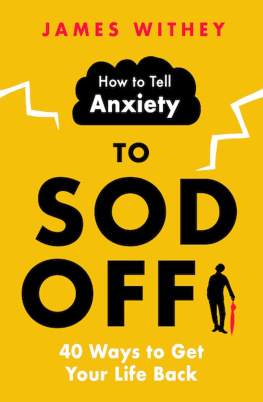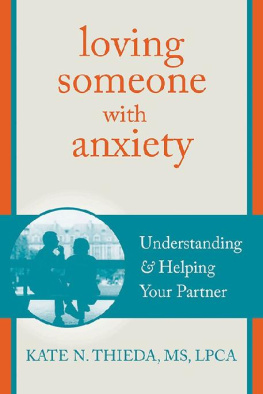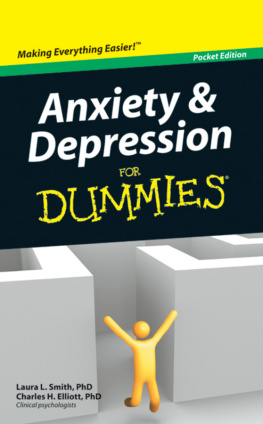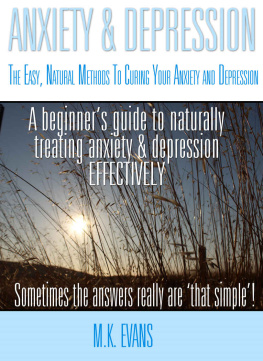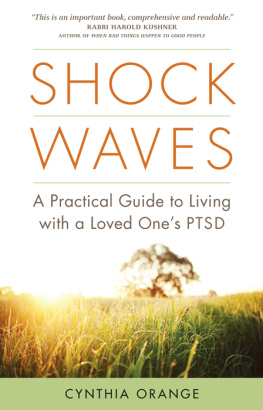
ABOUT THE AUTHOR
Lauren Callaghan (CPsychol, AFBPsS, PGDipClinPsych, PgCert, MA (hons), LLB (hons), BA) is a highly regarded clinical psychologist. She has worked at world-renowned research centres in London, UK, where she was recognised as a leading psychologist in the field of OCD, BDD and anxiety problems. Lauren received further qualifications in systemic family therapy and uses her expert skillset to work with individuals and their families to overcome obsessional and anxiety problems. After running a successful practice in London, she has recently moved to Sydney, where she continues to work as a clinical psychologist.
BY THE SAME AUTHOR
OCD, Anxiety and Related Depression
Body Image Problems and Body Dysmorphic Disorder
How to Help Your Child with Anxiety, OCD and Panic Attacks (2020)

First published in Great Britain 2020 by Trigger
Trigger is a trading style of Shaw Callaghan Ltd & Shaw Callaghan 23 USA, INC.
The Foundation Centre
Navigation House, 48 Millgate, Newark
Nottinghamshire NG24 4TS UK
www.triggerpublishing.com
Text Copyright 2020 Lauren Callaghan
All rights reserved. No part of this publication may be reproduced, stored in a retrieval system, or transmitted in any form or by any means, electronic, mechanical, photocopying, recording or otherwise, without prior permission in writing from the publisher
British Library Cataloguing in Publication Data
A CIP catalogue record for this book is available upon request from the British Library
ePUB: 9781789561326
Lauren Callaghan has asserted her right under the Copyright, Design and Patents Act 1988 to be identified as the author of this work Cover design by Bookollective
Typeset by Lapiz Digital Services
Printed and bound in Great Britain by CPI Group (UK) Ltd, Croydon CRO 4YY
Paper from responsible sources
DEDICATION
This book is dedicated to the tireless carers, partners and family members who love somebody with an anxiety or obsessional problem. Thank you for caring.
TABLE OF CONTENTS
INTRODUCTION
Thank you for picking up this book. You have probably selected it because someone you care for is suffering from an anxiety problem. From my perspective as a psychologist who has dedicated years to helping people recover from anxiety problems, your role is essential in helping your loved one get better. So, I want to thank you for being interested and caring enough to find out more about your loved ones problem and how you can help them.
I have written this book for you for the families, partners, and/or close friends of someone suffering from anxiety. It contains advice and recommendations that I give to my clients and their families in my clinic, which they have found extremely helpful to know how to best support their loved one with an anxiety problem.
During my career I have become passionate about sharing knowledge and research-based treatment strategies with people. I trained as a clinical psychologist in New Zealand before moving to London in the UK. Whilst there I worked at the well-known Maudsley Hospital at research centres for anxiety disorders and trauma alongside diligent and world-renowned academics and clinicians who dedicate their lives to finding more effective treatments for these problems. I am grateful for my experiences working at the Maudsley Hospital and for my wonderful supervisors who imparted their knowledge and skills and ensured that my clinical work was up to their (very high!) standards. I specialised in Cognitive Behavioural Therapy (CBT) for anxiety and obsessional problems and I am passionate about improving access to these treatments for people who may not be able to access them in traditional formats of face-to-face sessions.
I have also always been interested in how our relationships and family networks interact with our wellbeing, because as people, we do not live in social vacuums. We exist in a system of people and this system can be of great benefit as well as sometimes detrimental to our health. Prior to working at the Maudsley Hospital I worked with young people and their families and I completed my postgraduate studies in family therapy. By combining my specialisms and interests, I hope to be able to improve the lives of people and make a positive impact with my work. I believe I am truly a better psychologist for my experiences of working with my clients and their families, and consequently I have been inspired to write self-help books for people including families and partners of those suffering from mental health problems who cannot easily access good quality help.
What I hope to achieve in this book is to teach you about anxiety and obsessional problems and how you can offer practical help to your loved one. The content is based upon the many appointments I have had with the families of my clients with anxiety and obsessional problems and the questions they have asked. I hope you find this book helpful, that you uncover things you didnt know already or learn new strategies that you have yet to try. And if you know it all already and all you take from this book is inspiration to try to help your loved one in a different way, then I consider it a successful outcome!
I have asked Alissa Shaw to co-write this introduction. I worked closely with Alissa, her husband Adam, and their children when Adam was suffering from a particularly acute episode of OCD. He had had OCD since he was a child but kept it in check to the degree that he was very successful in business and had a wonderful family. At the time I met Adam he was very unwell and the whole family was struggling to cope. Alissa was incredibly supportive of Adam but she needed some guidance on how to help him and what to expect during the treatment process. Adam eventually made a full recovery and, through his commitment to give back to the community, Adam and I co-wrote a CBT self-help book for people suffering from OCD and anxiety called OCD, Anxiety and Related Depression The Definitive CBT Guide to Recovery . The idea was that through reading Adams story, the reader would find the treatment more relevant. The feedback we have had is overwhelming and has inspired me to continue trying to help people via self-help books.
As Alissa has experienced many of the learning points and recommendations I outline in this book first-hand, she is the ideal person to share her story and provide assurances that these strategies do indeed work. I would like to thank Alissa for agreeing to share her personal experience below:
To echo what Lauren has said, thank you for caring for your loved one with anxiety, and reading this book. As someone with first-hand experience of caring for someone with severe and crippling OCD, I know how tough, demoralising and incredibly stressful it is.
But I am happy to tell you that after undergoing treatment with Lauren, Adam got better. I had my husband back and our children got their father back. I hope you can relate to my story and that it gives you hope. Life can continue despite your loved one having a severe anxiety problem.
Our story started in Lanzarote in 2004. We went there to relax, unwind and enjoy a tranquil and slow-paced holiday, but it was a far cry from any of that. After a typical day by the pool, I went back to our house to find Adam lying on the bed in a teary, unintelligible state. Neither of us knew why.
Adam and I knew each other growing up and we share many sweet childhood memories. Our families were close and we took holidays together, sharing pizza evenings and going on family days out. We started dating when I was seventeen and Adam twenty-three.
Next page
